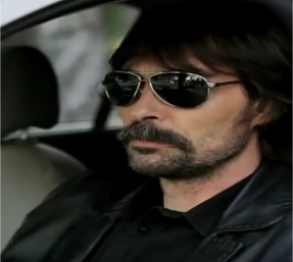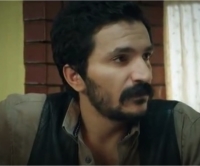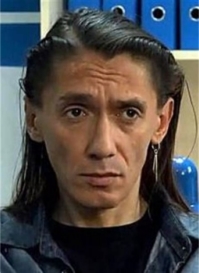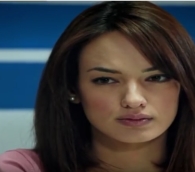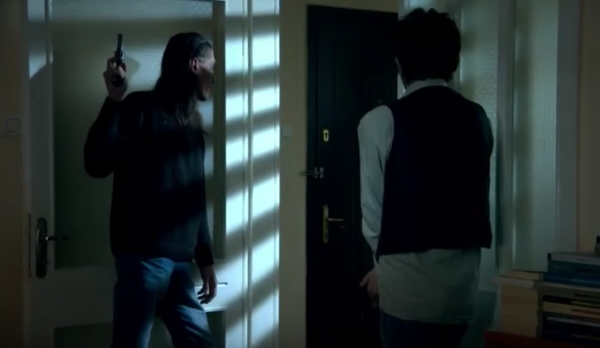|
burned by love,
yet loves to burn
No doubt some people
will find Behzat Ç too vulgar and too graphic in its scenes of torture
and murder and general human anguish. Man's inhumanity to man (and woman and
child) seems to be pushed well beyond the usual limits into a new kind of shock
theatre. The photo naturalism becomes voyeurism. Chic downtown villains shoot
victims between the eyes with sleek 9 millimeters as easily as blowing kisses
and hi-life/low-life women knife enemies as easily as preparing a meal. Behzat
Ç is violent alright and some will dismiss it as nothing more than a
soap opera of death, too absurd to be taken seriously... or simply the folly of
another 3rd World society pretending to be 1st World. The cheap sensationalism
of homicide a la mode reduces human behaviour to a sick tango of sexy
sadism and religious masochism. Predators, suckers, guns, knives... HGTV condos
and open sewers, trendy clubs, cafes and hillside cemeteries. Sounds like
Europe or the US, you think. You sigh, think, do I join in with some sanctions
against the Ankara government or do I retire to Turkey, buy a jug of
raki, and enjoy the ride?
So, in the end, is
Behzat Ç little more than a commercial for this nihilist anti-social
behaviour? Even Behzat himself sets a rotten example with his bullying,
pro-active violence and lousy manners. He doesn't wear a uniform, dresses like
a hood, drinks on the job, commits crime to solve crime, carries a badge yet
operates like a gangster. If he wasn't protected by his boss and powerful,
unseen people, he would be behind bars himself or prowling the sea-wall of some
castellated mental home like Hamlet crying the midnight blues. Yes, Behzat
suffers, and it's his suffering that allows us to see past his folly. He's a
victim par excellence, a patsy, another rat in the prison lab of human
existence. But he fights -- between the hangovers and the murders, he fights
with a feral cunning, and even when the truth is killing, he forgives,
survives, retains compassion, never surrenders completely to the dark side even
though he wears a black leather coat.
Behzat. Burned by
love, yet loves to burn.
"Suffer," he tells
Harun, his deputy, when Harun goes into meltdown over Larissa, the grifter
Ukrainian honeytrap. Or on another occasion, during the final showdown with
Captain Suna, the hyper-feminist killer cop, when she cries, "But Behzat you
torture people!", Behzat replies, "Yes, but I never kill them." While the
nuances of legitimate versus illegitimate violence might seem ridiculous here
because the degrees of moral separation get lost in the melodrama, the fact
remains that Behzat absorbs more violence than he dishes out, and his personal
suffering acts as a moral barometer in the game of right and wrong.
Even though he's a
mess, Behzat functions quite well, just like Robocop, injured on the inside but
rockin' on the outside. He's all business, a man of few words, preferring an
Esperanto of grunts and curses, body feints and eye flashes over talk. He's so
economical with language that he hangs up, or walks out rather than says
goodbye or hello baby. This is especially true of the first season, when he's
driven by the need to find his daughter's killer; by Season 2, you see a
gradual softening in his manner (and that of his team), as if the government
has told the producers of Behzat Ç that they'll shut the series down if
they don't present the police in less fascist way... or perhaps it's just the
script writers introducing political correctness into the scenario. There is a
decided movement from the killer as evil to the killer as victim as the
episodes pile up and the plotting moves inward. This is good, as it confirms
humanity in a rather inhuman landscape. Not for nothing is Behzat stuck in a
loop of predator and prey, symbolized by the wildlife documentaries he watches
at home as he drinks himself into a stupor on his down-market suede throne.
He frequently sleeps
where he passes out, fully-clothed, fully bohemian. In truth, Behzat is more
like an artist than a detective, bucking convention as he does, living in
fashionable squalor (his house is furnished like a cheap motel, its generic
indifference at once anti-materialist and personal), yet seeking beauty as
beauty is the only reason to continue living. He craves the female touch like a
wild dog who can only settle down when stroked by a magic hand. Yet you do
wonder if in fact Behzat is just another in a long line of Turkish bullies who
use corporal punishment and violence to extract a confession just for the sheer
pleasure of it. Just because he looks cute with his boy hippy haircut and
western desperado moustache and dangling prayer beads doesn't mean he's a 21st
Century liberal hep cat. For those of us who live further west, his
swash-buckling slouch and strut is a manner we admire, a style we all harbour
when we're tired of voting and nothing gets done. Behzat gets things done. He
might be rough, but he's honest, and if he punches a woman in the face, well
it's an honest mistake. Lawyers exist, but they only exist to clean up the
mess. In fact, by Season 2, he marries a lawyer, the Public Prosecutor Esra,
and she cleans up his mess, although she pays dearly for it.
The Freudian nightmare
that is his life deepens like an ancient hereditary wound, echoing Oedipus or
Lear or any doomed tragic hero whose misery transmits through the ages in
dreams and in the genes of the deranged. When Behzat is remanded to a mental
hospital following the suicide of his undergraduate daughter Berna -- actually
murdered, although he doesn't know this yet -- fate delivers to him a new
daughter, Süle, who becomes his saviour... and then, like a poisoned
chocolate, returns him to the abyss once again. An unknown child from an old
flame -- herself a suicide because of Behzat -- who in turn murders her
half-sister in a jealous attempt to usurp this 'woman' in Behzat's life. It's
tabloid, like anthrax in the mail... or UFOs seen through the windshield: he
wants to believe but somehow the lies keeping coming.
He has conversations
with multiple selves -- five, typically, like stand-ins for the five members of
his squad. His old friend Tekin is murdered -- bad enough, but when he learns
that Tekin had been corrupted by the gangsters who seem to control the higher
echelons of the police and the judiciary, even worse. Hope fades like a bad
screw.
Strangely -- or
perhaps typically -- Behzat is the centre of the universe. His squad waits
anxiously for his arrival, stand up when he enters, and even after hours, can't
drink too long without him. Even the arch-villain Escrüment Çozer
doesn't want to live without him, even though this prick cop has screwed his
business schemes, vanity murders, and sex life, has forced him into exile for a
period, even though he's the only one who seems to have the answers to Behzat's
problems. He knows who murdered Berna, he knows Behzat's mother is alive and
scheming, he knows who the bent officials are and the lines of corruption in
Ankara... this chameleon criminal knows all this as the voice inside a madman's
head knows, he knows, he knows, he knows what Behzat needs to know. Therefore
it's no surprise that by Season 3 Escrüment decides to "collaborate" with
Behzat, especially when it comes to finding out who ordered Esra's killing.
As a character,
Escüment Çözer starts out real, but as his outrageous killing
spree (mostly matters of "disrespect") in defence of his sex life and business
operations gets out-of-hand, his believability is only sustained by
photography. It's the cine and film editing that makes us cringe and thrill to
his master criminal agility, not the psychological portraiture. As a disco
Cassanova with a 9 millimeter and a nuclear credit card, he's acted to
perfection by Nejat Isler. The smile, the earrings, the up-market cars,
the wine, the coke, the babes, the lackies ready to clean up his mess, a
helicopter hovering nearby... sociopath, psychopath, anthropath... an Anatolian
thug with a jet-set life-style, happy in Istanbul, unhappy in Ankara... except
when he's messing with Behzat. As imagery, he provides comic relief from the
grim social realism of the working class murders, student riots, Gulen lefty
protests, robberies and domestic miseries. When he screws on his silencer to
take care of business, you might think (briefly) of the need for more gun
control, but more likely you're left thinking how easy it is to die at the whim
of some jerkoff who takes offence too easily. Escrüment Ç isn't a
character -- he's Death. He never had a childhood, never had a family, just
arrives, fully-formed and goes about his dirty business. You cut finger-nails,
EC cuts people. Behzat hunts killers, EC... hunts.
He's not alone. He has
a pal, a minder of sorts, another hitman in the employment of the Circle.
Basgan Memduh. You might think of Danny Devito when this guy arrives. He's
bigger, although not by much. Less funny, although not by much. He loves to
eat, worries about his weight, reminisces about his time as a special ops
commando eating snakes in the mountains. He shoots people too, and when EC is
in hiding or in exile, acts as an understudy. You're not quite sure if he's a
partner in equal standing with EC or if he's actually his handler, someone who
checks EC's excesses and supervises his escapes. The "Duck Man" tries to
eliminate him but somehow it's Memduh who eliminates the Duck Man. You're not
quite convinced by this scene beside the lake -- the razzle-dazzle gunplay
depends too much on camera editing rather than real action -- although you hang
in there for the laugh and because Memduh has become quite endearing... like a
favorite dog who shouldn't be killing the bunnies, but it's in his nature, so
what can you do? |
A pack of feral dogs
is briefly illuminated by a streetlight, cross the highway ramp after a vehicle
passes, disappear into the shadows on the hunt for food. In a condo, a man
'murders' his sex doll, and the day of Harun's wedding to a traditionalist girl
chosen by his parents, Ankara goes nuts with violence and murder. Man with a
shotgun shoots up a cafe, while another man knifes his wife after he dreams she
was unfaithful... and once again Ghost gets involved with a murderess.
A traffic cop
moonlights as a cartel sniper. A hitman whines about his weight. A kid kills
his grandpa with a pen. Etc.
Aristotle says "Drama
is an imitation of an action". Today, the media feed-back loop accelerates the
emotional need to imitate anything, including the imitation. Despite the moral
imperative invariably contained in endings and exits, sex and death remain the
most imitated events.

Nejat Isler as
the disco cassanova business man Escrument Cozer
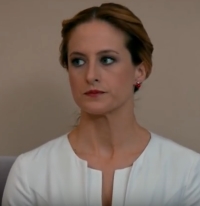
Esra,
Prosecutor and Behzat's second wife
|
